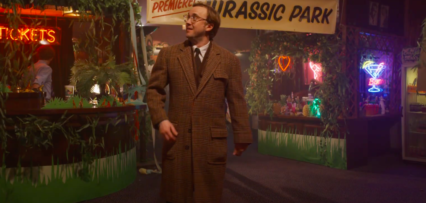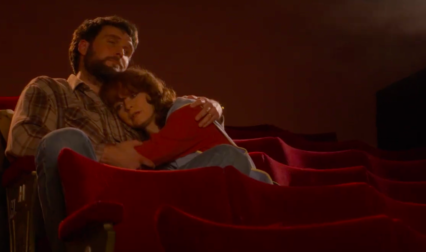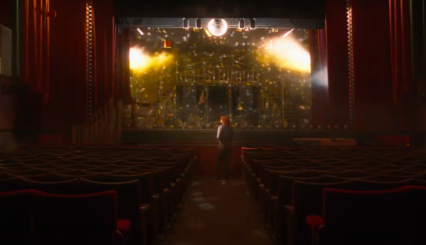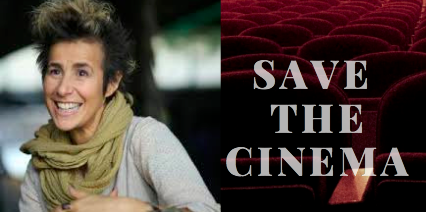Sky’s Save the Cinema follows the true story of Liz Evans who started an epic campaign to save Carmarthen’s Lyric theatre in the ’90s after plans were made to knock the cinema down and replace it with a shopping centre. Starring Samatha Morton, Jonathan Pryce, and Tom Felton, Caragh Medlicott sat down with director Sara Sugarman via Zoom to hear more about the making of the film and why its story is so timely during the pandemic.
Caragh Medlicott: I wanted to start by asking how you found filming in Carmarthen, and what the process of transforming the town so that it looked like the nineties was like? It must have been quite strange and nostalgic for the locals.
Sara Sugarman: Yeah, it was lovely – absolutely lovely. It stole my heart. All our hearts, really. The people were so nice and I’m not just saying that. So that’s number one. And then number two is that we had a budget. So, we were limited in what we could do to make it look like 1993. But we had just enough for paints and things like that. It wasn’t necessarily imaginatively 1993. I think the locals just thought there were a few new shops in town, it wasn’t necessarily obvious we were making a film because it was lockdown and there wasn’t much street traffic. That actually made it kind of difficult for us, because it was hard to find supporting artists to be in shots.
One of the things in terms of transforming it was the seats inside the Lyric theatre itself. Liz Evans – in all her glory – got the Lyric listed as a Grade II building, as well as a lottery grant, so all the seats were really posh plastic but they didn’t match the ones they would have had in the ‘90s. So, we had to go to the Resolven miners club which had the original seats from the Lyric and ask them if we could have them for the film, and they generously gave them to us. This is how it works with communities in Wales, that willingness to help others. We really want to raise the profile of the Resolven Miners Hall because they’re in the same position Liz was, the baton is passed on. But we installed those seats back in at the Lyric and that was the biggest job really. The fact we were able to use them felt like a nice metaphor for what the film is about; communities trying to save community and the power of one person helping a group of people.
Caragh Medlicott: Watching Save the Cinema made me think about the timelessness of underdog stories, especially when they’re based on real life like this one is. I wondered if you’ve always been drawn to that kind of story?
Sara Sugarman: 100%. That’s all I ever do. When I look back, everything I’ve ever done is about an underdog coming through, you know, a David and Goliath type thing. And I love when they’re set in Wales because, well, I love being Welsh. They’re also often about real people, I like to work from real life because my own imagination takes off with the discipline and structure of a true story as the basis.
Caragh Medlicott: So much of this film is about the power of community and the role of art within that. It feels especially timely with Covid and all the struggles that’s presented local arts scenes. Was that something you had in mind when making this film, and do you hope it might be empowering for audiences?
Sara Sugarman: Definitely. And I think that we all felt that. Sky Cinema felt that – the producers felt that. Everybody. Really, it was perfect timing for Save the Cinema. We hope it does empower people, even though it’s so difficult with Covid. And this film was made for everybody to watch, a true family film. It’s a streamer, so you can watch it at home, but we’d love for some people to go to the cinema and see it too. Now that we’ve all been vaccinated and for those who feel safe enough it can be a nice thing. It’s a very communal thing to go to the cinema.

Caragh Medlicott: Well, Spielberg’s Jurassic Park plays a large part in Liz’s plan to save the Lyric. It does seem apt as he has been very vocal recently about his faith in the cinematic experience, even with the disruptions caused by the pandemic. Do you think cinema will continue to bounce back as we recover from Covid-19?
Sara Sugarman: Well, listen, if we recover from Covid then I hope yes. It depends on the audiences, what the kids and the low-risk groups come out to see. I think there are certain experiences people will come out for when they really want to see it on a large screen. But I do think it’s shifted, too, with televisions getting bigger and bigger, with streaming, people may want to watch at home more. But, it does make me wonder about what form community will take. On the one hand community is more universal than in the old days. You know, you can connect with someone on the other side of the world and there are communities online. It’s a very interest philosophical concept that community may be more an intellectual idea than bodies in a room. But then, when you think about place, when you go to Wales, there’s a real soul. And these pockets of communities. It has that strong culture – the Celtic idea of music and song and poetry, it’s very much alive in Wales.
Caragh Medlicott: Was there a particular arts venue or community that was important to you growing up in Wales?
Sara Sugarman: Well, I couldn’t get to them. In my day you had to get to Mold for that stuff really. I remember my dad had a shop and on Saturday this lady called Trudy would come in. She was so cool. She had an earring with a feather in – and she was a member of a theatre company in Mold. She was the most glamorous thing in the world to me. But because I couldn’t get there I just did it all in my own bedroom, pretending I had an audience. Then at age 14 I went off to London on my own because in those days that’s where all the opportunities were. I’m pleased to say that’s not the case anymore. So much goes on in Cardiff and the south, though it hasn’t really reached north Wales yet. But there are still a few companies in north Wales. Either way, London isn’t essential anymore. But that’s what I had to do and I got a part in Grange Hill. You know, it was tough and hard. I’ve never managed to settle back in Wales since, but my heart is always here. These days my advice to anyone starting a creative career would be, stay in Wales!
Caragh Medlicott: What about a local cinema?
Sara Sugarman: Actually, my dad had an advert on at the cinema. It was one that you’d buy for five pounds a month – but I didn’t know my dad had rented it. It was just a board at the end for his shop. But I thought my dad was famous worldwide, so I think that set me up to think that I was destined for greatness. There was that, and there was also a little theatre in Rhyl which I believe I’m a patron of, and I got to be Aladdin in the pantomime there. I think the discipline of putting all your passion and ideas into something when you’re a kid, with the grown-ups giving you that attention, and then having the discipline to present it to an audience is a fantastic education and use of energy. It just gives everyone such confidence. That’s one of the reasons Liz Evans was so massively inspiring. These kinds of people live every day in Wales, they’re not doing it for power or money, they’re doing it because they care about the community and the kids.

Caragh Medlicott: The Lyric theatre really sits at the heart of this story, and I thought the way the theatre itself was shot had this very warm-toned, nostalgic look to it. How did you approach presenting both its beauty and its dilapidation?
Sara Sugarman: I love a bit of dilapidation. I remember when I was making my little films, when I started out, looking at the southwest valleys, I loved those contrasts. The headlights and sadness; the passion and talent that goes into certain moments like when you hear a male voice choir. I think in some ways the valleys, it’s like the sediment in a good bottle of wine. I’m very drawn to that sediment – something at the bottom of a thing that’s nearly over. Not that I want it to nearly be over. I think those ideas appealed to me – I find beauty in the people, in that someone in the community who fights back and says, ‘no, we’re not having you steal this. We’re not having it’. It’s fantastic.
Caragh Medlicott: Save the Cinema sometimes reminded me of Cinema Paradiso in the attention paid to the actual process of projecting a movie, and also the homage paid to films themselves like How Green Was My Valley?.
Sara Sugarman: That’s exactly right. And I certainly looked at all those films. You know, I love the Italian filmmakers. And I was definitely influenced by them. I mean our budget I feel was probably a lot smaller. But it was beautiful, and I know that Stephen Warbeck’s score was very influenced by that type of filmmaking. All the team have that open heart – we don’t care if people call it old fashioned. I mean it is an old-fashioned Ealing comedy, if you like, and I think that’s what it should be. That was intentional – what we all wanted. And I’m not apologetic for that. The roots of this are those types of films, Cinema Paradiso and Goodbye, Mr Chips. And why not? I love those films.

Caragh Medlicott: Overall, what was the most challenging aspect of working on this film, and was working with this particular cast as fun as I imagine it to be?
Sara Sugarman: It wasn’t always fun just because we were so busy working, but I’m glad that it looked like fun to you. That’s what we wanted. And it was always warm hearted. Everyone worked really hard. The most impressive thing was how the people at Carmarthen’s youth opera – which still exists – educate their children, like most kids, you know, they don’t just come on the stage performing like that. There’s a fantastic musical director and choreographer. The parents, too. It was amazing the way they coaxed them lovingly to put on these incredible performances. It was like going back to primary school!
Caragh Medlicott: That’s interesting, because in the film Jonathan Pryce plays a teacher, Mr Morgan, and the story does look at the importance of teachers and their role in inspiring the next generation.
Sara Sugarman: 100%. And that’s another thing I love, that in the valleys being a teacher is equivalent to being a rockstar. In London, maybe if you’re in a band and you’ve got a number in the charts that can count, but here if you’re a teacher that is having an impact – touching lots of kids lives – then that’s another kind of superstardom in the community. And I just love that about Wales.
Save the Cinema is in cinemas now and streaming via Sky.



 Enjoyed this article? Support our writers directly by buying them a coffee and clicking this link.
Enjoyed this article? Support our writers directly by buying them a coffee and clicking this link.








